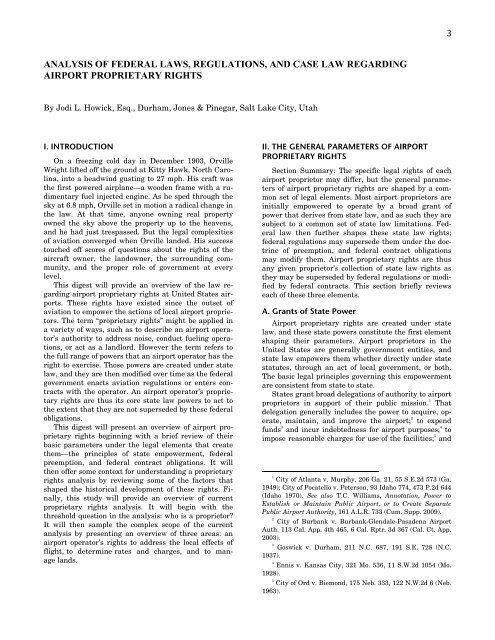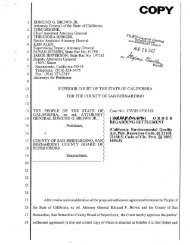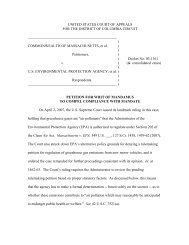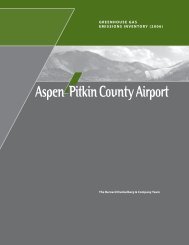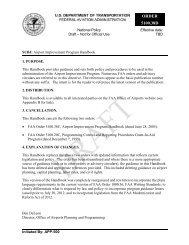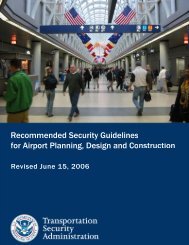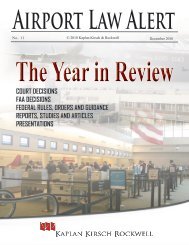ACRP Legal Research Digest 10
ACRP Legal Research Digest 10
ACRP Legal Research Digest 10
You also want an ePaper? Increase the reach of your titles
YUMPU automatically turns print PDFs into web optimized ePapers that Google loves.
3<br />
ANALYSIS OF FEDERAL LAWS, REGULATIONS, AND CASE LAW REGARDING<br />
AIRPORT PROPRIETARY RIGHTS<br />
By Jodi L. Howick, Esq., Durham, Jones & Pinegar, Salt Lake City, Utah<br />
I. INTRODUCTION<br />
On a freezing cold day in December 1903, Orville<br />
Wright lifted off the ground at Kitty Hawk, North Carolina,<br />
into a headwind gusting to 27 mph. His craft was<br />
the first powered airplane—a wooden frame with a rudimentary<br />
fuel injected engine. As he sped through the<br />
sky at 6.8 mph, Orville set in motion a radical change in<br />
the law. At that time, anyone owning real property<br />
owned the sky above the property up to the heavens,<br />
and he had just trespassed. But the legal complexities<br />
of aviation converged when Orville landed. His success<br />
touched off scores of questions about the rights of the<br />
aircraft owner, the landowner, the surrounding community,<br />
and the proper role of government at every<br />
level.<br />
This digest will provide an overview of the law regarding<br />
airport proprietary rights at United States airports.<br />
These rights have existed since the outset of<br />
aviation to empower the actions of local airport proprietors.<br />
The term “proprietary rights” might be applied in<br />
a variety of ways, such as to describe an airport operator’s<br />
authority to address noise, conduct fueling operations,<br />
or act as a landlord. However the term refers to<br />
the full range of powers that an airport operator has the<br />
right to exercise. Those powers are created under state<br />
law, and they are then modified over time as the federal<br />
government enacts aviation regulations or enters contracts<br />
with the operator. An airport operator’s proprietary<br />
rights are thus its core state law powers to act to<br />
the extent that they are not superseded by these federal<br />
obligations.<br />
This digest will present an overview of airport proprietary<br />
rights beginning with a brief review of their<br />
basic parameters under the legal elements that create<br />
them—the principles of state empowerment, federal<br />
preemption, and federal contract obligations. It will<br />
then offer some context for understanding a proprietary<br />
rights analysis by reviewing some of the factors that<br />
shaped the historical development of these rights. Finally,<br />
this study will provide an overview of current<br />
proprietary rights analysis. It will begin with the<br />
threshold question in the analysis: who is a proprietor?<br />
It will then sample the complex scope of the current<br />
analysis by presenting an overview of three areas: an<br />
airport operator’s rights to address the local effects of<br />
flight, to determine rates and charges, and to manage<br />
lands.<br />
II. THE GENERAL PARAMETERS OF AIRPORT<br />
PROPRIETARY RIGHTS<br />
Section Summary: The specific legal rights of each<br />
airport proprietor may differ, but the general parameters<br />
of airport proprietary rights are shaped by a common<br />
set of legal elements. Most airport proprietors are<br />
initially empowered to operate by a broad grant of<br />
power that derives from state law, and as such they are<br />
subject to a common set of state law limitations. Federal<br />
law then further shapes these state law rights;<br />
federal regulations may supersede them under the doctrine<br />
of preemption, and federal contract obligations<br />
may modify them. Airport proprietary rights are thus<br />
any given proprietor’s collection of state law rights as<br />
they may be superseded by federal regulations or modified<br />
by federal contracts. This section briefly reviews<br />
each of these three elements.<br />
A. Grants of State Power<br />
Airport proprietary rights are created under state<br />
law, and these state powers constitute the first element<br />
shaping their parameters. Airport proprietors in the<br />
United States are generally government entities, and<br />
state law empowers them whether directly under state<br />
statutes, through an act of local government, or both.<br />
The basic legal principles governing this empowerment<br />
are consistent from state to state.<br />
States grant broad delegations of authority to airport<br />
proprietors in support of their public mission. 1<br />
That<br />
delegation generally includes the power to acquire, operate,<br />
maintain, and improve the airport; 2<br />
to expend<br />
funds 3 and incur indebtedness for airport purposes; 4 to<br />
impose reasonable charges for use of the facilities; 5 and<br />
1<br />
City of Atlanta v. Murphy, 206 Ga. 21, 55 S.E.2d 573 (Ga.<br />
1949); City of Pocatello v. Peterson, 93 Idaho 774, 473 P.2d 644<br />
(Idaho 1970). See also T.C. Williams, Annotation, Power to<br />
Establish or Maintain Public Airport, or to Create Separate<br />
Public Airport Authority, 161 A.L.R. 733 (Cum. Supp. 2009).<br />
2<br />
City of Burbank v. Burbank-Glendale-Pasadena Airport<br />
Auth. 113 Cal. App. 4th 465, 6 Cal. Rptr. 3d 367 (Cal. Ct. App.<br />
2003).<br />
3<br />
Goswick v. Durham, 211 N.C. 687, 191 S.E. 728 (N.C.<br />
1937).<br />
4<br />
Ennis v. Kansas City, 321 Mo. 536, 11 S.W.2d <strong>10</strong>54 (Mo.<br />
1928).<br />
5<br />
City of Ord v. Biemond, 175 Neb. 333, 122 N.W.2d 6 (Neb.<br />
1963).


